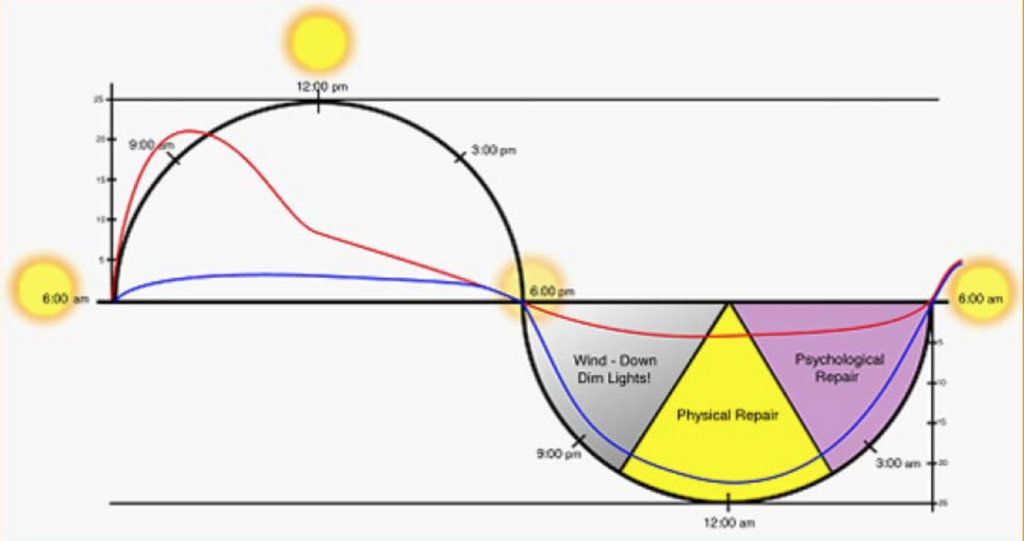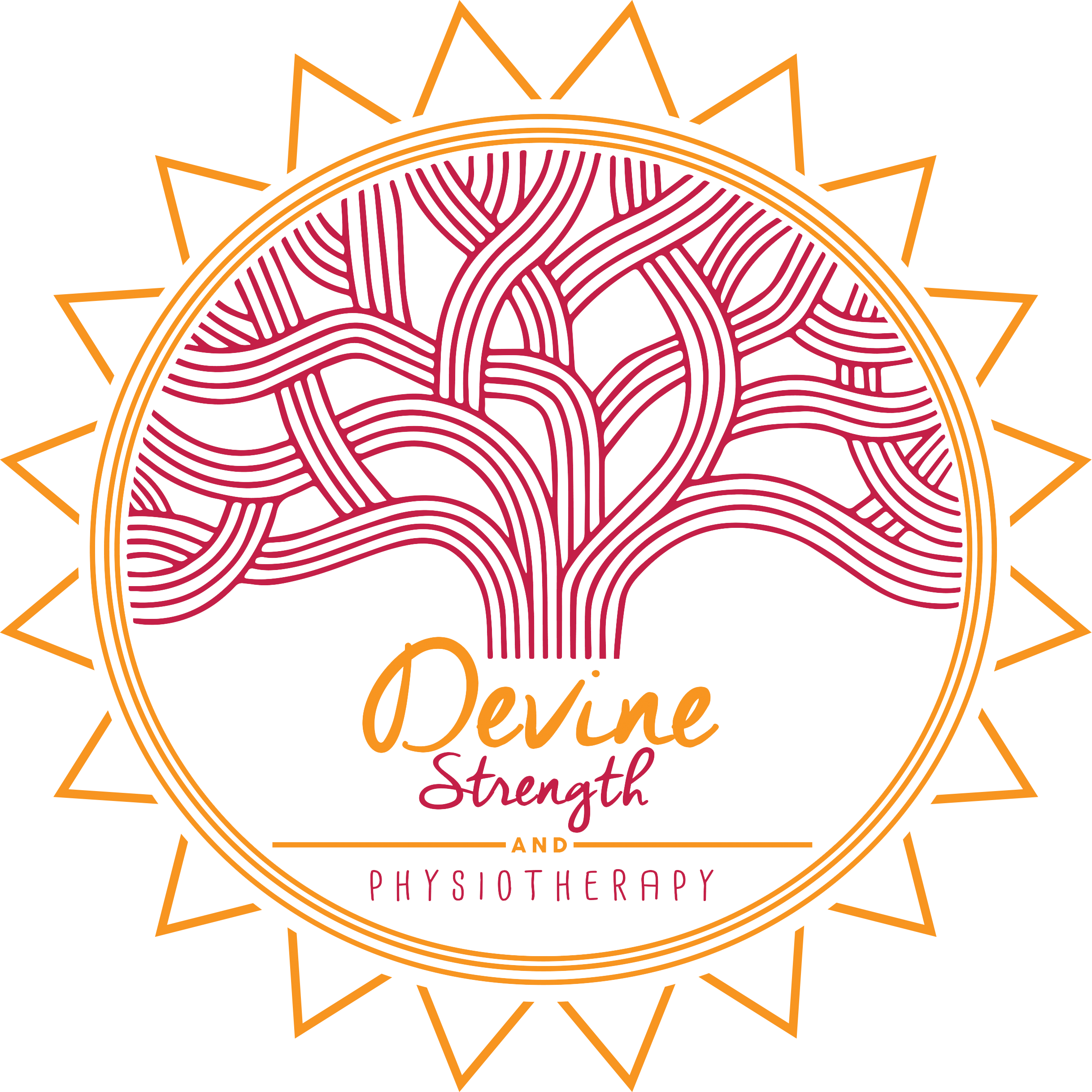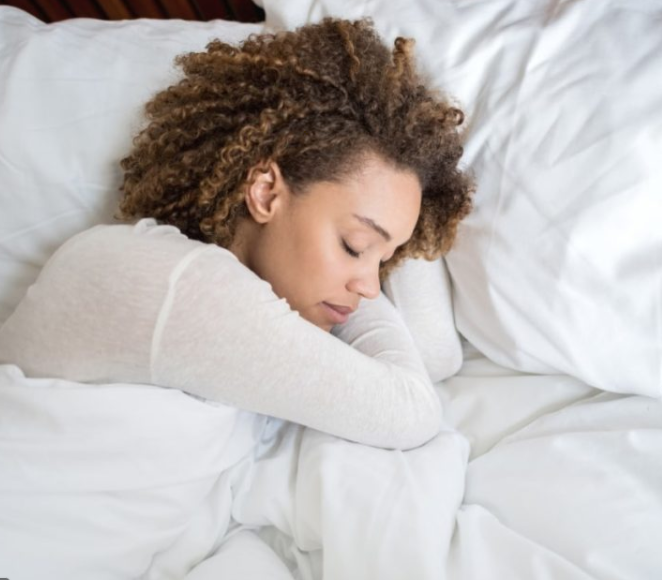Cortisol is a master hormone in the body. It has many roles, but is primarily a physiological response to any sort of stress trigger. Stress is triggered by situations perceived by our brain as a threat to survival – this could be anything from running away from a predator, avoiding a near miss traffic collision, anxiety around a relationship, finances or job, losing all the work you just spent hours on, or negative thoughts about yourself or others.
At certain times of the day, our body functions optimally when cortisol shows up in a cascade – the highest amounts in the morning help us feel alert when we wake up and get ready for the day. As the day goes on, there is a gentle downward slope so that cortisol is at its lowest point in the evening.
Melatonin plays an exact opposite cascade rhythm, that is dependent on cortisol being low enough and staying low enough throughout the night for it to be effective. Melatonin is produced independent of cortisol levels – it is produced from the signal of light. As sun fades and darkness grows, melatonin is produced. There are a series of chemical conversions involving serotonin and B vitamins to create sufficient melatonin IN ADDITION to the environmental cues we give our senses. There needs to be enough melatonin produced throughout the night, and in concert with cortisol staying low, this creates for an optimal deep nights sleep for 7-8 hrs.
This opposing interaction of hormones is called a circadian rhythm. The red line in the graph pictured below represents cortisol levels. The blue line is melatonin levels, and the relative times these shift their emphasis.

This rhythm does not just “run on its own.” Some people can be engaged with an activity well into the night because of their engagement with it. There are others where, even if occupied, will be tired no matter how much they play fun games throughout the night. So sleep hygiene is the term given to certain behaviors and attitudes towards how we (as individuals) prepare our unique mind, and thereby signal our unique body, in preparation for that optimal sleep our bodies crave.
4 Tips for optimizing your sleep…
1. Sleep hygiene!
Minimize exposure to blue light 2 hours before bed: As said before melatonin responds to light, more specifically, certain wavelengths of light. Blue light, same wavelength as sunlight, at night time inhibits melatonin production thus upregulating cortisol levels. This can make falling asleep and staying asleep difficult. The most common sources of artificial blue light come from TVs, tablets, smart watches, PCs/laptops and cell phones. We recommend reducing your blue light exposure at least 1-2 hours before bed. Most of the newer aforementioned electronics have blue light filters to promote more red light exposure at night. If your device does not have one there are apps like f.lux and twilight that will suffice. We recommend not using your devices altogether for the best sleep. Buying amber color lights, red lights or candle lights are amazing options to optimize sleep and upregulate your natural sleep cycle. Wearing glasses such as True Dark brand, help to block out blue light and reduce eye fatigue when working on the computer.
There are also supplemental options that encourage increased production of melatonin – like serotonin or 5-HTP. These are pathways that need other nutrients to create the desired product and not stall half way through. These also would interfere with certain antidepressant medications, so make sure you discuss with the provider who manages your meds before pursuing supplementation with these. Melatonin can also be supplemented starting at the lowest dose possible. Sometimes that isn’t helpful though, because the issue is more cortisol dysregulation, rather than not enough melatonin. If you may wake up more groggy when taking 5HTP/tryptophan/melatonin, the cortisol balance is likely a better thing to address. Learning about your stress triggers would be beneficial.
Herbal teas and tinctures are a great all natural source of destressing and calming our nervous system. You have probably seen multiple different types of bed time teas at the market. Most of them are great to try with sleep. I recommend that the brands be organic to reduce the chance of pesticide or mold exposure. Another way is to make your own. Being in Eugene we are lucky enough to have access to multiple herbs in our grocery store or at Mountain Rose Herbs. Herbs to start off with include: chamomile, lavender, skullcap, lemon balm (Melissa), passionflower, oat straw and valerian root. All the aforementioned herbs are great for sleep and reducing stress and anxiety. We even grow some of them in our garden. Please check with your naturopath or functional medicine provider to see what herbs would be best for you.
2. Support your body’s capacity to handle stress:
The best way to do this is to sleep… However, in the absence of being able to do that, there is some learning to do that will be very helpful for you long term to regain that important tool! Everyone in their mind and body responds differently to stress based on how we were raised, as well as what life experiences we’ve had or how taxed our immune system is.
Physically, adaptogenic herbs, like genseng, holy basil, ashwaganda or mushrooms like reishi, and maitake support the physical response to cortisol levels rather magically. It will support adrenals to produce more cortisol due to chronic sustained stress (more than a month) or other disease process, OR support the body systems to break down the cortisol (in the liver) if it has been too high.
Learning diaphragmatic breathing or breathing techniques also significantly improves your ability to “read” and check in with your body and your mind. Physically, diaphragmatic deep breathing sends a signal to the nervous system of safety. There is a lot of research available about the effect meditation has to benefit multiple different aspects of your nervous system and immune system. This is a very powerful way to control your stress/anxiety in the moment as well. There are multiple types of meditation, choose the one that works best for you. We offer free meditations with Dr. Devin on our website.
Mentally, this may look like pursuing counseling, therapy, biofeedback or face head on the recurrent issue that you know continually come up and take over your physical energy – even though it’s not something physically your body is coming up against. If you continually have a tough time in your relationships or financially, this can create a sustained cortisol release when it creates anxiety as a response. Stress is always going to be a part of being alive – it allows up to grow! However, we need to have enough reserves in our mental, emotional and physical body to allow that stress to create growth and not wear down our bodies and mind by limiting our sleep. Our therapies help build that reserve!
3. Exercise:
Having a regular exercise routine helps to manage blood sugar levels and is a great way to manage stress and regulate the cortisol rhythm. Exercise helps to get rid of any physical stress stored up in your body, so it does not come back to haunt you later. On a scale of 1-10 of intensity of exercise aim for 5-7 rate of perceived intensity for 20-30 minutes most days of the week. This can be walking, biking, swimming, dancing not only HIIT or running.
4. Blood sugar regulation:
Under stressful conditions, cortisol provides the body with glucose by tapping into protein stores via gluconeogenesis in the liver. This energy can help an individual fight or flee a stressor. However, elevated cortisol over the long term consistently produces glucose, leading to increased blood sugar levels. Chronically elevated stress increases blood sugar levels, thus making you more insulin resistant and prone to Type 2 diabetes. This chronically elevated stress keeps adrenaline and sugar levels elevated making it more difficult to fall asleep and prone to anxiety and insomnia.

